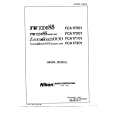|
|
|
Kategorie
|
|
Informacje
|
|
Polecamy
|
|
|
 |
|
|
Dla tego produktu nie napisano jeszcze recenzji!
 ;
Dobrej jakości skan - wkońcu mogłem poznać wszystkie funkcje tego odtwarzacza - polecam .
 ;
Gruba instrukcja - poprostu wszystko co potrzreba - polecam .
Style 2
REFRIGERATOR USE
Ensuring Proper Air Circulation
In order to ensure proper temperatures, you need to permit airflow between the refrigerator and freezer sections. As shown in the illustration, cool air enters through the bottom of the freezer section and moves up. Most of the air then flows through the freezer section vents and recirculates under the freezer floor. The rest of the air enters the refrigerator section through the top vent.
1. Tube Clamp 2. Copper Tubing 3. Compression Nut
3. The ice maker is equipped with a built-in water strainer. If local water conditions require periodic cleaning or a well is your source of water supply, a second water strainer should be installed in the ¹�� in. (6.35 mm) water line. Obtain a water strainer from your nearest appliance dealer. Install at either tube connection. 4. Plug in refrigerator or reconnect power.
Normal Sounds
Your new refrigerator may make sounds that your old one didn�t make. Because the sounds are new to you, you might be concerned about them. Most of the new sounds are normal. Hard surfaces, such as the floor, walls, and cabinets, can make the sounds seem louder. The following describes the kinds of sounds and what may be making them. s If your product is equipped with an ice maker, you will hear a buzzing sound when the water valve opens to fill the ice maker for each cycle. Your refrigerator is designed to run more efficiently to keep s your food items at the desired temperatures and to minimize energy usage. The high efficiency compressor and fans may cause your refrigerator to run longer than your old one. You may also hear a pulsating or high-pitched sound from the compressor or fans adjusting to optimize performance.
s
Do not block any of these vents with food packages. If the vents are blocked, airflow will be prevented and temperature and moisture problems may occur. IMPORTANT: Because air circulates between both sections, any odors formed in one section will transfer to the other. You must thoroughly clean both sections to eliminate odors. To prevent odor transfer and drying out of food, wrap or cover foods tightly. See the �Refrigerator Features� section for details.
Using the Control(s)
For your convenience, your refrigerator control(s) are preset at the factory. When you first install your refrigerator, make sure that the control(s) are still preset to the mid-settings as shown. NOTE: To turn your refrigerator off, turn the refrigerator control to the word OFF or until the word OFF appears. Your product will not cool when the refrigerator control is set to OFF. Mid-setting �3�
You may hear the evaporator fan motor circulating air through the refrigerator and freezer compartments. The fan speed may increase as you open the doors or add warm food. Rattling noises may come from the flow of refrigerant, the water line, or items stored on top of the refrigerator. Water dripping on the defrost heater during a defrost cycle may cause a sizzling sound. As each cycle ends, you may hear a gurgling sound due to the refrigerant flowing in your refrigerator. Contraction and expansion of the inside walls may cause a popping noise. You may hear air being forced over the condenser by the condenser fan. You may hear water running into the drain pan during the defrost cycle.
s
s
s
s
s s
Mid-setting �3�
9
|
|
 |
> |
|

